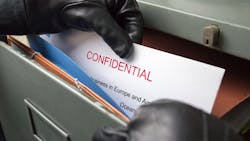Nine Ways to Combat Corporate Espionage
The term corporate espionage conjures images of Mission Impossible style break-ins or sophisticated cyber hackers accessing trade secrets with a few keystrokes. Attempting to thwart intellectual property attacks, companies justifiably commission complex firewalls and erect high-tech fortresses. But what if the thief is already inside?
With the rise of digitization, it is increasingly more difficult for manufacturers to control illegal transfer of intellectual property and trade secrets. Years of research and development, technical schematics and proprietary formulas can float into the cloud in seconds or be swiftly loaded onto a stick drive and pocketed.
Based on my 30-plus years of experience helping United States-based companies’ outbound operations to Europe, Southeast Asia, Japan and China, mitigating risk of corporate espionage centers on people: employees and vendors. To discourage illegal behavior, it is essential to foster loyalty and a zero-tolerance culture for theft of any kind.
Here are nine key ways to combat corporate espionage.
1. Vet joint venture partners—seriously.
Joint ventures result in less control over workers and operations and require careful vetting. Unfortunately, some governments assist local companies in acquiring intellectual property through espionage. Without due diligence, a joint venture partner may be the nation’s government with an ulterior motive.
2. Pay top wages for top foreign execs.
In China and elsewhere, the competition for quality leaders is fierce. Misunderstanding a country’s compensation rate and securing top leaders at a below market value increases the risk of disloyalty and exposure to intellectual property theft.
3. Forget using expats.
It’s best to have a high-level national running the operation. An effective, local recruiter is key to attracting and engaging the right talent for the role. A native-born leader who understands cultural norms and nuances helps foster a loyal, productive workforce.
4. Understand when women are superior.
In China, women business leaders are respected and equal to male peers with a reputation for being tough and honest. Also, they are known for greater loyalty than men, who tend to jump from opportunity to opportunity. In Korea, women are not perceived equally and would not garner the required respect.
5. Cash is key to protect IP.
Compensating leaders for protecting intellectual property elevates its importance and drives leaders to establish and enforce trade secret protection from the top down. Leaders must adopt a ruthless approach, where even minor violations result in immediate dismissal and full prosecution under law.
6. Always be unpredictable.
Maintain tight controls by conducting unannounced visits to overseas operations or hiring local investigators to monitor activities. Unreported additional shifts or second factories producing white label knock-offs derived from stolen intellectual property can happen. Unscheduled, on-site inspections help detect and deter illicit manufacturing.
7. Rely on local lawyers.
For overseas operations, a local, established and reputable law firm delivers great value in providing unique cultural insights, understanding unwritten business codes, and seamlessly navigating relationships with in-country resources such as investigators and regulatory agents.
8. Understand that IP risks start at home.
Domestic manufacturers must also be vigilant with employees regarding intellectual property and trade secrets. A yearly, all-employee meeting to review confidentiality agreements and reinforce their importance helps reestablish workforce commitment. During exit interviews, all employees should be reminded of their signed confidentiality agreement and the legal consequences of breaking it. For top personnel, intensify the significance by conducting the meeting with legal counsel present.
9. Beware of CEOs, salesman and techies.
Scientists and technical personnel excited by their discoveries may inadvertently leak confidential information at industry conferences. Ambitious sales personnel can easily walk off with key customer or product data. While CEOs, understandably proud of a unique market offering, have been known to boast within earshot of ready-to-pounce competitors. Traveling overseas with electronic devices also poses a threat of intellectual property theft. Wipe computers before traveling, keep them in possession at all times or leave them stateside.
While legislation, including the Economic Espionage Act of 1996 and the new Defend Trade Secrets Act of 2016, serve to deter theft and provide a course of action after the fact, aggressive protection of current intellectual property and continuous innovation to remain ahead of the market—and economic thieves—are the best defenses for remaining competitive whether manufacturing in the U.S. or abroad.
Dennis Unkovic is an international business lawyer with Meyer, Unkovic & Scott, LLP and Chairman of Meritas, an international alliance of law firms. Unkovic has published six books and more than 150 articles on international business issues and advised hundreds of U.S. and foreign companies on conducting business activities around the globe.His new book, “Face: How Saving Face Changes Everything,” is available now on Amazon.com as a Kindle Single.
